Mosses - Study guides, Class notes & Summaries
Looking for the best study guides, study notes and summaries about Mosses? On this page you'll find 376 study documents about Mosses.
All 376 results
Sort by
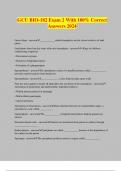 Popular
Popular
-
GCU BIO-182 Exam 2 With 100% Correct Answers 2024
- Exam (elaborations) • 11 pages • 2024
-
- $11.49
- 2x sold
- + learn more
GCU BIO-182 Exam 2 With 100% Correct Answers 2024 Green Algae - answer____________ called charophytes are the closest relatives of land plants. Land plants share four key traits with only charophytes - answer• Rings of cellulose- synthesizing complexes • Peroxisome enzymes • Structure of flagellated sperm • Formation of a phragmoplast Sporopollenin - answerIn charophytes a layer of a durable polymer called _____________ prevents exposed zygotes from drying out Sporopollenin - ...
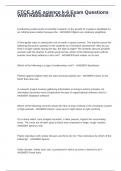 Popular
Popular
-
FTCE SAE science k-6 Exam Questions With Rationales Answers
- Exam (elaborations) • 6 pages • 2024 Popular
- Available in package deal
-
- $10.39
- 1x sold
- + learn more
Conducting certain kinds of scientific research on the growth of crystals is facilitated on an orbiting space station because the - ANSWER-Objects are relatively weightless A third grade class is starting the unit on earth in space science. The teacher poses the following discussion question to the students as a formative assessment. Why do you think it is light outside during the day, the dark at night? The students discuss possible answers with the teacher in whole group format. which of th...
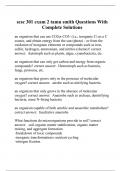
-
scsc 301 exam 2 tamu smith Questions With Complete Solutions
- Exam (elaborations) • 11 pages • 2023
-
Available in package deal
-
- $12.99
- 1x sold
- + learn more
an organism that can use CO2or CO3- (i.e., inorganic C) as a C source, and obtain energy from the sun (photo) - or from the oxidation of inorganic elements or compounds such as iron, sulfur, hydrogen, ammonium, and nitrites (chemo)? correct answer: Autotroph such as plants, algae, cyanobacteria, etc. an organism that can only get carbon and energy from organic compounds? correct answer: Heterotroph such as bacteria, fungi, protozoa, etc. an organism that grows only in the presence of mol...
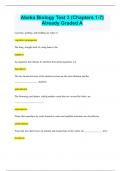
-
Abeka Biology Test 3 (Chapters 1-7) Already Graded A
- Exam (elaborations) • 9 pages • 2024
- Available in package deal
-
- $9.99
- 1x sold
- + learn more
Abeka Biology Test 3 (Chapters 1-7) Already Graded A Layering, grafting, and budding are types of vegetative propagation The long, straight shaft of a long bone is the diaphysis An organism that obtains its nutrition from dead organisms is a Saprophyte The two broad divisions of the skeletal system are the axial skeleton and the ___________________ skeleton appendicular The flowering seed plants, which produce seeds that are covered by fruits, are ________________________ angios...
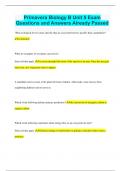
-
Primavera Biology B Unit 5 Exam Questions and Answers Already Passed
- Exam (elaborations) • 4 pages • 2023
- Available in package deal
-
- $8.49
- 1x sold
- + learn more
Primavera Biology B Unit 5 Exam Questions and Answers Already Passed What ecological level is more specific than an ecosystem but less specific than a population? community What are examples of secondary succession? Select all that apply. A severe drought kills most of the species in an area. Once the area gets more rain, new vegetation starts to appear. A mudslide removes most of the plant life from a habitat. Afterwards, some mosses from neighboring habitats start to move in. Which of the ...
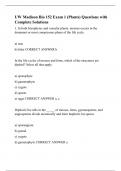
-
UW Madison Bio 152 Exam 1 (Plants) Questions with Complete Solutions
- Exam (elaborations) • 26 pages • 2024
-
- $16.49
- + learn more
1. In both bryophytes and vascular plants, meiosis occurs in the dominant or most conspicuous phase of the life cycle. a) true b) false CORRECT ANSWER b In the life cycles of mosses and ferns, which of the structures are diploid? Select all that apply. a) sporophyte b) gametophyte c) zygote d) sperm e) eggs CORRECT ANSWER a, c Diploid (2n) cells in the _____ of mosses, ferns, gymnosperms, and angiosperms divide meiotically and form haploid (1n) spores. a) sporangium b) gonad...
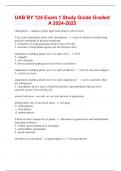
-
UAB BY 124 Exam 1 Study Guide Graded A 2024-2025
- Exam (elaborations) • 18 pages • 2024
-
Available in package deal
-
- $13.49
- + learn more
charophytes - (aquatic) green algae land plants evolved from 3 key traits land plants share with charophytes - 1. rings of cellulose-synthesizing proteins embedded in plasma membrane 2. formation of a phragmoplast (helps form cell wall) 3. structure of flagellated sperm (not all will have this) adaptations enabling plants' move to land: why? - 1. CO2 2. sunlight 3. soil- nutrients 4. fewer predators/pathogens (never been seen before) adaptations enabling plants' move to land: pro...
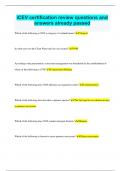
-
iCEV certification review questions and answers already passed
- Exam (elaborations) • 24 pages • 2024
-
- $9.99
- + learn more
iCEV certification review questions and answers already passed Which of the following is NOT a category of wetland biome? Tropical In what year was the Clean Water and Air Act created? 1948 According to the presentation, ecosystem management was broadened by the establishment of which of the following in 1978? Conservation Biology Which of the following does NOT influence an organism's niche? Commensalism Which of the following best describes a pioneer species? The first spec...
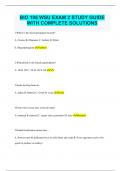
-
BIO 106 WSU EXAM 2 STUDY GUIDE WITH COMPLETE SOLUTIONS
- Exam (elaborations) • 17 pages • 2024
- Available in package deal
-
- $9.99
- + learn more
BIO 106 WSU EXAM 2 STUDY GUIDE WITH COMPLETE SOLUTIONS 1.Where is the microsporangium located? A. Ovaries B. Filaments C. Anthers D. Petals E. Megasporangium Anthers 2.What ploidy is the female gametophyte? A. 1N B. 2N C. 3N D. 4N E. 6N 1N 3.Seeds develop from an.. A. anther B. Embryo C. Ovule D. ovary Ovule 4.From who's tissue does a fruit develop? A. maternal B. paternal C. zygote (new generation) D. bees Maternal 5.Double fertilization means that...... A. flowers mu...
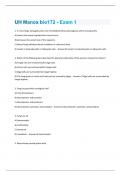
-
UH Manoa bio172 - Exam 1 Questions And Answers Rated A+ New Update Assured Satisfaction
- Exam (elaborations) • 10 pages • 2024
- Available in package deal
-
- $7.99
- + learn more
1. In most fungi, karyogamy does not immediately follow plasmogamy, which consequently A) means that sexual reproduction cannot occur. B) decreases the overall size of the organism. C) allows fungi withstand harsh conditions in a dormant state. D) results in heterokaryotic or dikaryotic cells. - Answer-D) results in heterokaryotic or dikaryotic cells. 2. Which of the following best describes the physical relationship of the partners involved in lichens? A) Fungal cells are enclosed within ...

That summary you just bought made someone very happy. Also get paid weekly? Sell your study resources on Stuvia! Discover all about earning on Stuvia


